Why Animal Crossing Succeeded Where Social Games Failed
Seemingly everyone is playing Nintendo's new life sim at the moment -- even those who would never normally touch social games. What's Nintendo done differently to the hundreds of Facebook game developers out there?
This article first appeared on USgamer, a partner publication of VG247. Some content, such as this article, has been migrated to VG247 for posterity after USgamer's closure - but it has not been edited or further vetted by the VG247 team.
I'm still in that strange early phase of my relationship with Animal Crossing where I'm fumbling around trying to work out what I'm supposed to be doing.
Having never really played the series much before, it's an initially bewildering experience to have so little in the way of clearly defined objectives -- but I know one thing: I've stuck with Animal Crossing far longer than I ever cared to continue playing a Web-based social game, which are probably Animal Crossing's closest equivalents in gameplay terms.
A bit of background for you: prior to USgamer's launch, my job for the last year and a bit was reviewing mobile and social games. Although the vast majority of them were complete and utter crap, the principle of a social game is a sound one: something you can play asynchronously with your friends at your own pace, and which doesn't necessarily demand hours of commitment at a time.
Unfortunately, something went wrong in the process somewhere, and social games, for the most part, became startlingly efficient monetization machines while sacrificing anything even remotely resembling satisfying gameplay.
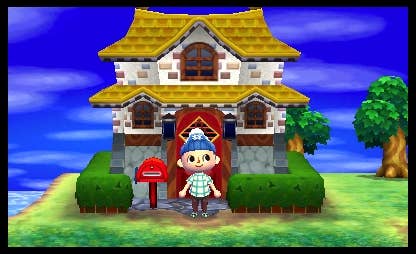
The issue, of course, is that social games are primarily designed (or at least produced and funded) by people whose primary specialism is business and the psychological manipulation of an audience to convince them to part with their money, not people who design great games. There are a few exceptions, of course -- most notably, game industry luminaries Brenda and John Romero have both been involved in a number of social game projects to varying degrees of success -- but for the most part, spending five minutes with your average Facebook game makes it abundantly clear that it's not particularly interested in entertaining you; it's interested in getting your money.
So where does Animal Crossing fit into this? Well, because it follows almost the exact same mold as many social games do, but it strips out the aggressive monetization completely, making it an infinitely superior, more satisfying experience that keeps people coming back day after day.
Let's look at some of the reasons Animal Crossing beats the pants off Facebook games.
Play As It Suits You
Social games' wait timers are an inconvenience to get you to pay; Animal Crossing's delays are a means of building anticipation.
The vast majority of today's social games incorporate mechanics that actively limit you from playing the game -- usually some combination of an energy system (which limits how many things you can interact with in a single session before having to either wait or pay to continue) and a timer system (where things take varying amounts of real time to complete, but which can usually be sped up by spending money). While this encourages people to play the game in short, bite-sized chunks, it's the wrong way to go about this; it's not giving the player the choice as to how much they want to play, it's setting an upper limit on how much they're allowed to play -- a crucial difference.
Animal Crossing doesn't limit how much you can play in a single session. Early in the game, you may well find yourself running out of things to do -- particularly if you're playing in the middle of the night and you haven't yet unlocked access to the tropical island's valuable bounty -- but at no point does the game stop and tell you that no, you can't play any more unless you cough up some real money. Sure, some of the game's characters will occasionally berate you in a light-hearted manner if you've been playing for a while, but the game certainly doesn't punish you for wanting to play for more than five minutes.
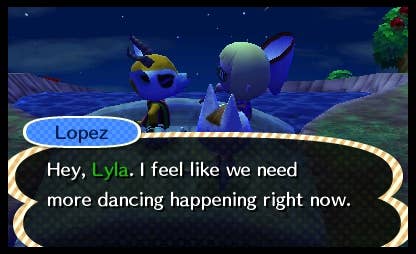
Animal Crossing does, however, have things that take a set amount of time to complete -- and unlike social games, there's no way of bypassing these delays. Ask Tom Nook to remodel your house? It'll be ready tomorrow, and there's no way of speeding that up. Finish paying for one of your village's public works projects? It'll be ready tomorrow, too, and there's no way of speeding that up, either.
Here's the difference between Animal Crossing and a social game's "please wait four hours for your sheep to be delivered" mechanic: the social game's wait timer is a deliberate inconvenience designed to get you to pay to bypass the delay; Animal Crossing's delays, meanwhile, are a means of building anticipation and getting you to come back to play again the next day. Keep playing Animal Crossing each day and there'll always be something new to see, whether that's a new resident, a newly remodelled house or a bridge over the river that makes getting around town that much easier. It provides incentive to keep playing every day without making use of social games' immersion-breaking "Daily Bonus" mechanics, whereby you're given arbitrary rewards for logging in day after day; you come back because you want to, not because you're being bribed to.
Social Play With Meaning
Animal Crossing provides a true sense of interaction, sharing and communication with other players.
Most social games aren't actually that "social" at all -- they're multiplayer solitaire games in which you concentrate on building up your own farm/city/iguana ranch and don't actually interact directly with other players for the vast majority of the time.
The most common "social" mechanic in social games is the ability to "visit" a friend's farm/city/iguana ranch and "help" them. In practice, this tends to mean that you can click on five (always five, for some reason) things in their farm/city/iguana ranch and receive some rewards for doing so; despite being called "helping," it's an inherently selfish action, because it rewards the one doing the "helping" rather than actually providing any benefit to the one being "helped." Besides clicking on these five things once per day, there's usually very little you can actually do while visiting a friend, so it becomes a rote action: burn through your energy stock on your own farm/city/iguana ranch, then click through your friends list one by one to pick up your rewards. Repeat until bored. Because you're rewarded each time you "help" a friend, it encourages you to build up a friends list of hundreds of people; this is the reason why most social games have Facebook pages and App Store reviews consisting of nothing but hundreds of vapid morons bellowing "ADD ME DAILY PLAYER" into the void.

Occasionally some social games feature a "request" mechanic, whereby certain objects cannot be constructed until a specific set of resources have been collected. These resources tend to not drop particularly frequently when playing by yourself -- or at all, in some cases -- and as such, you become dependent on your friends to send you said resources. The silly thing with this mechanic is that your friend doesn't actually need to own any of said resource -- they simply need to accept your request, and a tomato/nail/bag of iguana feed will magically appear as if from nowhere and be sent to you. This isn't interaction and sharing. More often than not, there isn't even the facility to directly communicate with other players.
Compare and contrast with Animal Crossing's approach to socialization. It's not perfect, no, but it's a damn sight better than that seen in your average Facebook game. By opening your village's gates, you can invite visitors either from your nearby vicinity via local Wi-Fi, or from your 3DS' friends list via the Internet. When that visitor shows up, they're actually there in your village -- you can see them, talk to them, interact with them, play with them. They can explore your village and marvel at the sights -- and even make a mess of it if they so desire. They can send letters to your villagers which you'll later be able to read; they can take the fruit from your trees and plant them in their own village; they can accompany you on a trip to the tropical island for a bug-catching extravaganza.
In short, Animal Crossing provides a true sense of interaction, sharing and communication with other players: you're not visiting people for selfish reasons (well, except for collecting the fruit you don't yet have in your own village) -- you're visiting them because you want to see them, or because they invited you, or because you want to do something together, or because you made a deal of some sort. There's no particular benefit or reward for collecting an enormous friends list; you should simply visit a friend's village because you want to, not because you're bribed to. Wait a minute, didn't I say that already...?
Pay Once, Play Forever
You can't buy your way to success; an important life lesson for young players, perhaps.
This particular phrase is mostly used by MMO developers who want to highlight the fact that they haven't made a free-to-play game, but also that they're not charging mandatory subscription fees to play their game. It fits Animal Crossing well, too, and marks probably the biggest difference between Nintendo's games and the bajillions of near-identical Facebook games out there: namely, the fact that once you've bought Animal Crossing (and, of course, something to play it on) you won't have to pay anything else with your real money for all the time you continue to play the game. (And Animal Crossing games are designed to be played for a long time.)
The reason why this makes such a big difference is because the differing business models between Animal Crossing and your average Facebook game spill over into gameplay. Animal Crossing has no obligation to get you to spend money once you're already playing; for all Nintendo cares, you can boot it up once, hate it and never play it ever again and it won't matter because you've already paid. Facebook games, meanwhile, have no initial cost of admission, and as such are on a constant quest to "convert" free players into paying ones.
There are a number of ways in which they do this, two of which are the energy and timer systems mentioned above. But that's not all they do.

One of the most insidious, unpleasant practices in free-to-play gaming in general, but primarily in Facebook games, is that of "pay to win" -- the presence of certain items that can only be purchased using real money which provide a significant advantage over other players. The exact form these take depends on the game, but they usually allow faster progression or, in the case of social games that do actually feature some form of direct competition, a noticeable and unfair advantage over someone who isn't paying. Despite the fact that most social games tend to fall into the "multiplayer solitaire" mold described above, there's still a strong element of competition involved thanks to the "visiting" mechanic -- everyone wants to have an awesome farm/city/iguana farm to show off to friends who stop by, so what better way to achieve that quickly than by dropping a few dollars on it?
In short, Facebook games' mechanics are designed almost exclusively around monetization. Every little thing in these games is there for one of two reasons: to hook you in to the game in the first place (daily bonuses, experience point/levelling systems, unlocks and achievements, the ability to brag to friends), or to encourage you to spend money (energy systems, timers, "exclusive" items, special offers).
Back in Animal Crossing-land, meanwhile, there's no such ability. You want something, you better be prepared to work for it. Want to pay off your home loan? Find a way to make money rather than buying coins. Want to deck out your room with cool items? Better do some favors for your village's residents, or trade with your friends. Want your village to look awesome? Plan carefully; plant trees, bushes and flowers; use designs on the floor to make paths; buy items that you think will look good around town with the money you earned yourself. You can't buy your way to success; you have to work for it. An important life lesson for young players, perhaps.
Where Social Games Have the Upper Hand
Animal Crossing has a few unfortunate shortcomings that mean despite the fact it does almost everything considerably better than your average social game, it will likely never pull in the same astronomical user figures as, say, Zynga's titles at their peak. These shortcomings are simple: the fact it runs on a 3DS; the fact it's not free-to-play; and the fact it doesn't link in with established social networks such as Facebook and Twitter.
The first is probably the most serious. Facebook games' popularity these days is due to the fact that pretty much everyone has access to a Web-capable computer either at home, at work or both. You don't need any specialist hardware and you don't even need a particularly powerful computer to run a Facebook game: you can just click on a link and be playing within a matter of minutes. Animal Crossing, meanwhile, requires that you own a specific piece of hardware that, despite Nintendo's bold efforts to reach out to non-gamers with product lines such as its Touch Generations range of software, is still seen primarily as something for "gamers" rather than the masses. So far as dedicated gaming hardware goes, the 3DS is hard to beat, but it still doesn't have anywhere near the reach of an iOS device or Web browser.
The second is also an issue. Despite the fact that "free-to-play" often actually means "aggressively monetized," particularly with regard to social games, it's difficult to deny the power the lack of an admission cost carries. Market something as "free" (even if, practically speaking, it's not really) and you'll get hundreds, thousands, millions of people willing to check it out. Put out a $34.99 game, however, and people will be more hesitant to give it a try -- particularly if they're not sure if they'll actually like it or not.

The latter is more murky; by not connecting to Facebook or Twitter directly, Animal Crossing doesn't saturate people's feeds with irrelevant nonsense that makes non-players sick of the game before they've even tried it, but at the same time Nintendo's clunky Friend Code system makes it somewhat cumbersome to add new friends to the game. The in-game "best friend" messaging system is a good idea, allowing players to chat with one another even if they're not in the same town, but in order to register someone as a "best friend" they have to actually visit your town first -- not always easy to coordinate. It would also be nice to have the ability to send letters to other people's towns without having to visit them, but in the absence of such features, Twitter and Facebook have actually proven ideal for coordinating visits and bug-hunting parties, even without any direct connectivity within the game itself.
Despite all these little issues, however, the fact that Animal Crossing provides a significantly superior, more enjoyable, less business-focused experience than your average Zynga timewaster (while ostensibly being designed around many of the same aesthetic principles) means that I'll stick with Nintendo's charming little life sim far longer than I could ever bear to continue playing CityVille. I just hope that social game developers take a good look at the things Animal Crossing does well and consider how they can incorporate them into Facebook and mobile games that suck just a little less than they do right now.
Now if you'll excuse me, I think Isabelle is calling.
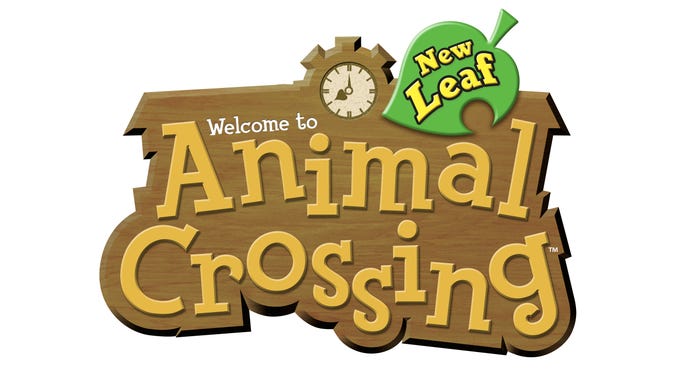
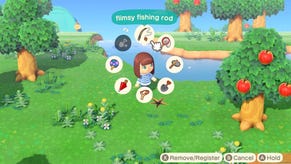
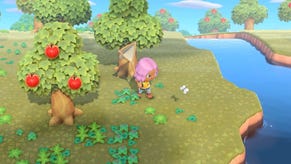
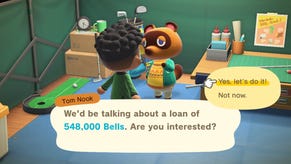
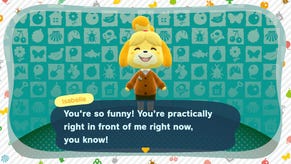
.jpg?width=291&height=164&fit=crop&quality=80&format=jpg&auto=webp)
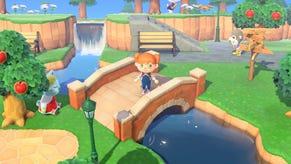
.jpg?width=291&height=164&fit=crop&quality=80&format=jpg&auto=webp)
.jpg?width=291&height=164&fit=crop&quality=80&format=jpg&auto=webp)